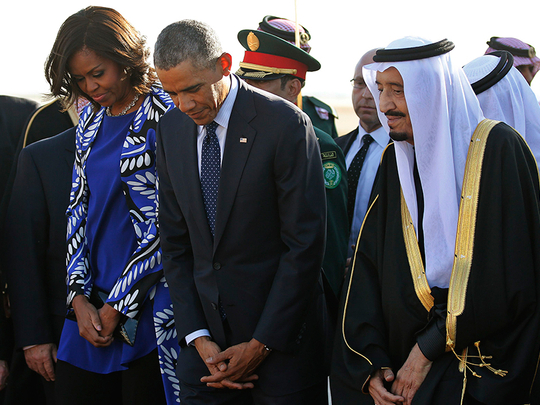
Riyadh: US President Barack Obama arrived in Saudi Arabia on Tuesday to pay his respects after the death of King Abdullah, a trip that underscores the importance of a US-Saudi alliance that extends beyond oil interests to regional security.
US Deputy National Security Adviser Ben Rhodes told reporters Obama wanted to discuss with the new Saudi King Salman the fight against Daesh, the volatile situation in Yemen and talks on ending a long-running dispute about Iran’s nuclear ambitions.
“We do believe that Saudi policy will remain quite similar to how it’s been under King Abdullah,” he said, adding Obama wanted to forge the same kind of “close relationship” with Salman as he had with his predecessor Obama’s visit comes as Washington struggles with worsening strife in the Middle East and counts Saudi Arabia among its few steady partners in a campaign against Daesh militants who have seized swathes of Iraq and Syria.
The US security headache worsened last week with the resignation of Yemen’s government after clashes in the capital involving Iran-backed rebels — a setback to US efforts to contain Al Qaida in that country and to limit the regional influence of Iran.
The Yemen government’s collapse will be of deep concern to Saudi Arabia because of the long border they share and because of the advance of Iran, Saudi Arabia’s main regional rival.
Saudi Arabia’s role in rallying Arab support for action with Western countries against Daesh has won praise in Washington, which along with other Western nations values the kingdom as an important market for its defence industries.
Following Abdullah’s death last week, Obama will try to get relations off to a smooth start with King Salman, who takes power after a period of sometimes tense relations between Washington and Riyadh. Showing how crucial the Saudi alliance is for Obama, he cut short his visit to India to lead a high-ranking delegation to Riyadh.
“Whatever the final communique says, the subjects most likely to be discussed are Syria, Iran, [Daesh], and oil prices,” wrote Simon Henderson, an expert on US-Saudi relations at the Washington Institute for Near East Policy.
“The most interesting question for President Obama will be whether King Salman and his team of advisers have an order of priority that differs from King Abdullah’s,” he said.
King Salman led an honour guard of senior Saudi princes and officials to greet the Obamas as they disembarked, including the crown prince and deputy crown prince and the kingdom’s veteran oil minister Ali Al Nuaimi.
US criticism of Saudi Arabia over its human rights record has normally been low-key and may remain so.
Obama said in an interview with CNN that the United States had to balance its pressure on Saudi Arabia and other allies over human rights with its immediate concerns about terrorism and regional stability.
“With all the other countries we work with, what I have found effective is to apply steady, consistent pressure, even as we are getting business done that needs to get done,” Obama said.
Saudi authorities have been criticised by international rights groups for jailing several prominent activists, and for the public flogging this month of a blogger.
Despite an alliance between the two countries that has long been a cornerstone of US Middle East policy, the kingdom has made clear its impatience with the Obama administration’s failure to do more to oust Syrian leader Bashar Al Assad and its anxiety over US-led efforts to negotiate a nuclear deal with Iran.
This added to a sense among Saudi rulers that Obama was neglecting old Arab allies, most notably with the US
abandonment of Egyptian President Hosni Mubarak when he was toppled by mass protests in early 2011.
US-Saudi relations have improved in recent months after Obama made a fence-mending visit to Riyadh last March.
The two countries have found renewed purpose for their security partnership in the joint fight against Daesh, though Saudi Arabia remains unhappy with Obama’s resistance to large-scale US arming of the mainstream Syrian rebels.
Even though an energy-self-sufficient United States no longer relies on Saudi oil supplies, the kingdom’s willingness to keep oil output high despite tumbling global oil prices has bolstered Obama’s domestic economic recovery efforts as well as his strategy of keeping pressure on oil producers Russia and Iran. Both those nations are under international sanctions.
Still looming, however, is the prospect of a nuclear deal with Iran, which would be a major legacy achievement for Obama but which Saudi Arabia worries could help strengthen Tehran’s influence in the region.









